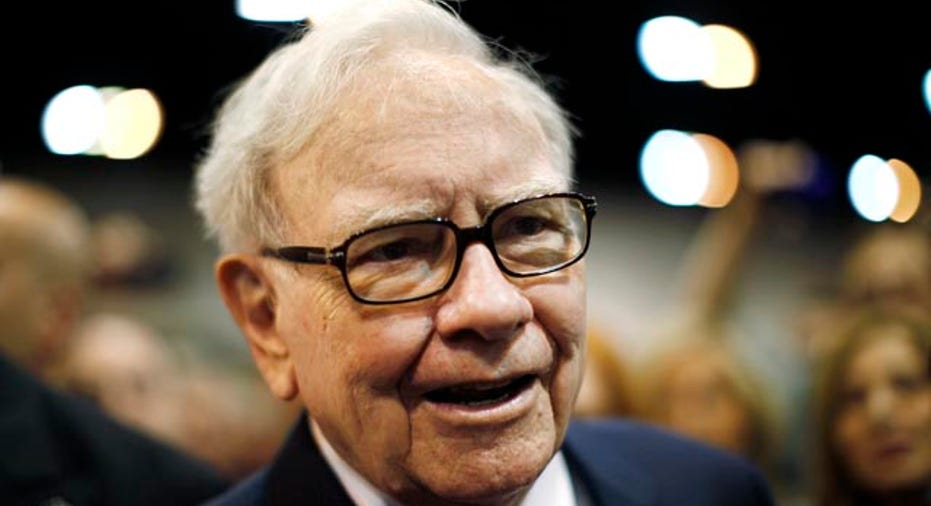Buffett, Board Agree on Next Berkshire Chief

Warren Buffett and the board of his conglomerate Berkshire Hathaway Inc are "solidly in agreement" on who should be the company's next chief executive, he said at Berkshire's annual shareholder meeting on Saturday.
But the 82-year-old Buffett also insisted the company would remain a partner of choice for distressed companies even after he is gone, saying if the tides went out, the "naked swimmers" struggling in the water would seek Berkshire's help.
Whoever ultimately takes over Berkshire will run a conglomerate that employs more than 280,000 people in dozens of businesses worldwide, covering everything from ice cream to insurance and retail to railroads.
During the financial crisis and its immediate aftermath, Berkshire helped prop up a number of companies, among them blue-chips such as General Electric and Goldman Sachs. Many have referred to those deals as Buffett effectively granting his seal of approval to those businesses.
Short-seller Doug Kass, invited to the meeting by Buffett to offer a contrarian point of view, asked whether the successor would have the same heft. Buffett said it would not matter.
"Berkshire is the 800 number when there is really some panic in the markets, and people really need significant capital," Buffett said.
"If you come to a day when the Dow has fallen 1,000 points a day for a few days and the tide has gone out and you find some naked swimmers, those naked swimmers ... will call Berkshire," he added.
But Buffett, as with past practice, did not actually identify his successor as CEO. Speculation usually focuses on a small group of top Berkshire executives, among them insurance boss Ajit Jain and railroad leader Matt Rose.
Both Rose and Greg Abel, the CEO of Berkshire utility company MidAmerican Energy, answered portions of audience questions Saturday, which is unusual for the meeting.
"Buffett hasn't broken much new ground, but he's handled Doug (Kass)'s question well ... and, as always, reinforced the Berkshire culture every chance he's had," said Jeff Matthews, founder of hedge fund Ram Partners LP and a noted Buffett biographer.
ECONOMIC INDICATOR
Berkshire's breadth means that its performance is often seen as a barometer for the broader economy. On Saturday, Buffett said he stood by the actions taken by the U.S. Federal Reserve, even as he cautioned the Fed's program could be "very inflationary."
"This is like watching a good movie, and I do not know the end," said Buffett. "We have benefited significantly, and the country has benefited significantly, by what the Fed has done."
Earlier Saturday, one of Buffett's top lieutenants said things were picking up but could improve further.
"It feels like a 2 percent economy. If we want to see GDP click up to 3.5 percent, 4 percent, you need to see more consumption," said Rose, CEO of the railroad Burlington Northern, in an interview.
Rose said BNSF was seeing "across the board" increases in demand to ship things like concrete, roofing tiles and cars.
NO TWITTER, THANK YOU
Buffett may be optimistic about the economy, but he is decidedly more cautious about technology. Earlier this week he finally joined Twitter, taking the handle @WarrenBuffett - but insisted he only knew enough about it to press a button when someone told him to.
On Saturday he said he disagreed with the recent guidance from the U.S. Securities and Exchange Commission that lets companies release material information on Twitter. Some see that as a threat to Berkshire's press release service Business Wire.
"The key to disclosure is accuracy and simultaneity ... I do not want it, if I am buying Wells Fargo, to keep hitting up their web page and hoping I'm not 10 seconds behind someone else for some important announcement," he said.
He also stuck by one of Berkshire's more controversial investments, its recent acquisition of a number of newspapers. The annual meeting crowd applauded when CNBC anchor Andrew Ross Sorkin asked a critical question about the stable of papers.
"It's not going to move the needle in Berkshire ... we are buying the papers at very, very low prices with (regard to) current earnings," Buffett said, adding that he expected to meet or beat a 10 percent rate of return, after-tax.
Yet as much as investors want to hear about Berkshire's growth potential and the state of the economy, some also attend the meeting just for a good laugh.
The meeting opened, as it does every year, with a video montage. This year's included a duet between Buffett and singer Jon Bon Jovi and a take-off on the TV series "Breaking Bad."
Some of the best comedy, though, usually comes in the verbal sparring between Buffett and Vice Chairman Charlie Munger over the course of the day. The two are close - they shared an oversize box of peanut brittle during the meeting - but Munger's acerbic tongue pops out from time to time.
"I come to see Charlie Munger needle Warren Buffett - only he can," said Sherman Silber, a doctor and shareholder.
(Writing by Ben Berkowitz; editing by Matthew Lewis and Bob Burgdorfer)



















